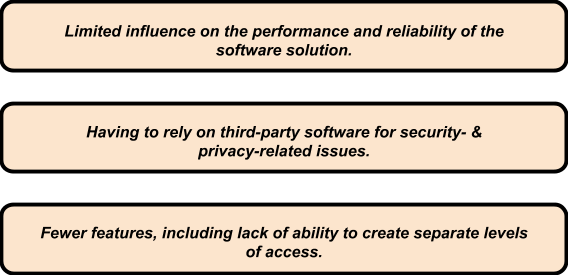25 August 2020
Custom ticket and event management software in 2021 – how to succeed?

Are you interested in organizing an event? Or perhaps you’re managing multiple events and thinking of the best way to get it all under control? You may be thinking of getting ticket and event management software. But what kind? Should you go for one of the popular ready-made event management solutions, or perhaps get developers to build you an entirely new custom event management application? As it is usually the case, there is no one right answer. Let’s take a closer look at the topic of event management software.
There is no way around it, the ticket and event industry has probably seen better days than the COVID-struck year of 2020. To manage events t0day takes more effort and skill than ever before. But the situation is not anywhere near as grim as it may seem at first glance.
In this article, we’re going to go over the pros and cons of using ready-made and building custom ticket and venue applications. Before we go there though, let’s take a step back, because the circumstances in which we are talking about it are surely quite unusual.
Ticket and venue management software trends in 2021
According to the report by Mordor Intelligence, the event software management market was valued at over 8 billion dollars in 2019 and is projected to reach near 15 billion by 2025. With a yearly growth rate of 10.65%, events management software is a mature and yet still fast-growing market.
Producers of event management software seem to be primarily targeting companies that manage or/and organize events for other organizations (third-party planners) since they usually manage multiple events and they are more in need of powerful management software.
In addition to a growing number of sports, gaming, or entertainment events, there are more and more specialized kinds of events, including corporate events for employees, both for professional and leisure purposes.
COVID-19 impact on the event industry
This has been the case before the impact of COVID. Now, we’re (temporarily?) experiencing shifts in these trends, but it doesn’t mean that the industry is doing all that badly. The COVID situation saw an incredible increase in the number of online events and the complexity of handling them (specialized remote communication and cooperation software to supplement the traditional events planning software). It’s reasonable to assume that at least some organizers will commit to online events for the foreseeable future. The event companies that reacted to the sudden change fast, were able to defend their profits best.
If anything else, this teaches us how important it is to react to unpredictable market events in this industry.
Ready-made event management software in 2021
If you would like to take advantage of ticket and event management software for your company, you might consider buying or subscribing (Software as a Service) to one of the many ready-made software options available in the market.
Such programs differ in terms of features and pricing schemes, but they generally target companies that organize anywhere from one to a couple events, mostly first-party organizers. They are easy to start with and set up, but as we are going to prove later, the easy start comes with a price.
Some of the event software options you might consider include:
You might choose the popular Meetup.com service. It makes for a good event schedule software (you can advertise your events well in advance with the purpose to increase attendee engagement). It allows you to set up a page for online registration for your event and charge an admission fee, but the options to customize your event page and the availability of event planner tools are limited. It is a good choice for small events as well as an additional way to give your event coverage, on top of a more robust solution.

A robust SaaS service with plenty of event management tools that allow event organizers to create event pages, organize event registration, sell tickets and pay per paid ticket. Organizers with more complex events and various types of tickets may tailor the conditions on an individual basis.
An interesting all-in-one event management solution that has features for both event organizers and attendees, including reminders and other useful event management tools to improve the attendee engagement of the event-goers.
If you are using a CMS like WordPress, you might go for software for events management in the form of a plugin that will allow you to set up a page and ticket selling feature on your own page. This may require some customization and perhaps the help of a programmer as this kind of plugins are often not quite as straightforward as they might seem at first glance.
All of these choices and more are viable for single event organizers as well as companies for whom events are not their primary business. If you build your business around events and act as a third-party ticket and venue management provider, there are many reasons why they may not be a good idea. Some of the most straightforward:

But there is more and it has everything to do with the long-term consequences of going for a ready-made solution as a ticket/event focused organization. Let’s take a look at them based on a couple of past projects from The Software House.
Custom event management software – when you should consider it
As we have shredded, ready-made software can be a good choice for organizers of one or a couple events. But when the management of events becomes your primary business, with the intention to scale up in the future, it’s time to consider a custom solution. It’s just like they say: don’t build your house on somebody else’s land.
Building event management software from scratch gives you many competitive advantages, which we’re going to present with examples from our own portfolio of custom projects. Let’s go!
The case for scalability
Unless you own a completely customizable platform based on modern technologies and programmed from scratch by skilled devs, you will inevitably run into situations where further growth of your business may be very difficult. From a technical standpoint, the platform needs to be designed for scalability from the start, which includes proper architecture, technologies that can stand the test of time and top-of-the-line programming. Let’s take a look at a good example of that.
Reservix is a large ticket and venue management platform from Germany. They grew fast, but at some point, they realized that they can no longer efficiently add new features, such as content creation options for editors and event owners. The service suffered from performance issues as well. Rather than endlessly rely on gimmicks, they decided to create a new future-proof platform.
The team at Reservix came up with initial UI/UX designs and they hired a team of TSH devs, which included React and full-stack programmers. They were satisfied to find out that TSH developers were interested in helping to fine-tune the concept rather than just implement the original one.
“Good technical knowledge, thinking outside-the-box, being active in the process of software development, e.g. helping to shape the app design instead of just going by provided specification,” explains TSH’s QA specialist Michał Sałata.
LESSON: If you plan on succeeding in the event management industry, bet on a software solution that is scalable by design.

The case for customizability
If you want to complete customizability and the ability to perfectly tailor your software to any business need you might have, creating a new platform from scratch is definitely the way to go.
A ready-made program can have a lot of features. But it’s hard to predict exactly what features you’re going to need. There may be many that you won’t need as well as many missing that you could use. The team at Ticketpark constantly came up with new ideas for useful features for their event business.
“Among new functionalities suggested by Ticketpark and added by our backend developers, there is a CRM panel for event organizers, flexible voucher system, support for large events (with 1000+ seats), mechanisms automating the accounting tasks, improved customer service, and many more,” we can read in the Ticketpark case study.
LESSON: To have software that meets all your business needs usually means getting a custom solution.

The case for getting it done ASAP
If you want to be able to respond to unpredictable market conditions, easily pivot when needed, land a deal with a tight deadline, outpace your competition and generally cut your time-to-market as much as possible, quality custom software development is the best way to do it. To illustrate this point, let’s take a look at StageClip.
StageClip makes it easy for students to create individualized videos from their graduation ceremonies. Much like many companies from the event industry, they also had to quickly move to the web in response to COVID.
As we can read in the case study, the original version of the software wasn’t prepared for such an increase in online activity and new features were needed as well. A team of TSH developers committed itself to writing a brand new application in React and Node in a record-breaking time, making it possible for StageClip to land new deals and turn a grim situation into a success.
LESSON: If you want to be fast on the market, go for a custom solution.

Ticket and event management software in 2020 – summary
As you can see, while ready-made ticket and venue software is a perfectly viable option for many businesses, there are plenty of scenarios when custom development is a better option. When you:
- support multiple complex events,
- build your business primarily around events,
- aim for long-term success,
- desire lots of features,
- seek superior time-to-market,
going for a custom event and management application will eventually pay off.
A quick event management system comparison:
| Ready-made event software | Custom event software | |
| Features | Limited and lacking flexibility | Unlimited and dependent on business needs |
| Performance | Depends on the quality of third-party software, can’t be tailored | Depends on the quality of developers, can be tailored |
| Scalability | Danger of outgrowing the solution | Potentially limitless |
| For whom? | For companies for whom events aren’t core business | Companies with business models centred around events |
Building a company in the event business today is an especially demanding endeavor. But a custom software solution can turn a lot of potential disadvantages into advantages. With a good idea and strong technical support, you can outrun your competitor and provide your customers with a new offer tailored to the changing market circumstances. And you can respond to any new changes that are taking place at a lighting speed.
If you want to learn more about your options and consult your event management software idea, do not hesitate to contact us. Initial consultations are free of charge!
Are you in the process of developing an event software solution of your own?
Let’s talk about your fundamentals and build from there!

